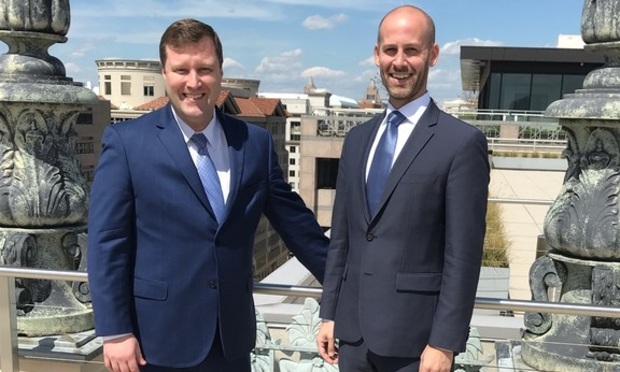Strip-Search Case Could Reshape Supreme Court's Immunity Doctrine
The petition on behalf of the girl has drawn wide support from “cross-ideological groups,” as one amicus brief put it.
May 06, 2019 at 12:10 PM
5 minute read
The original version of this story was published on National Law Journal
 Evan Young, left, and Scott Keller, right. Photo: Tony Mauro/NLJ
Evan Young, left, and Scott Keller, right. Photo: Tony Mauro/NLJ
The case of a Colorado 4-year-old girl who was strip searched by a government social worker could prompt the U.S. Supreme Court to take a new look at its “qualified immunity” doctrine that lets officials off the hook in some circumstances when they violate an individual's civil rights.
At the court's May 16 private conference, the justices will consider whether to grant review in the case of I.B. v. Woodard. The U.S. Court of Appeals for the Tenth Circuit in January dismissed the girl's claim that case worker April Woodard violated the Fourth Amendment by stripping and photographing her without a warrant or parental consent. The search came after allegations that the child had been abused.
The petition on behalf of the girl has drawn wide support from “cross-ideological groups,” as one amicus brief put it, including the American Civil Liberties Union and the NAACP Legal Defense and Educational Fund as well as groups like Alliance Defending Freedom, the R Street Institute and the Second Amendment Foundation. Hogan Lovells partner Cate Stetson is counsel of record on the amicus brief.
“I think the fact that the groups are not the types of groups that you typically see joining together—that's going to get some attention,” said Baker Botts partner Scott Keller, counsel of record on the girl's petition. Keller described the circumstances as a “tragic case.”
The case may also appeal to the Supreme Court, Baker Botts partner Evan Young said, because “it presents qualified immunity in a slightly different context from the traditional case of the police officer doing his best to deal with a fleeing suspect.” Young added, “Without saying anything about how to handle those, it's clear that those are harder cases than one in which someone had a series of false allegations that could be readily verified by taking steps that were far short of completely stripping a girl.”
To a degree, the case also mirrors Safford Unified School District v. Redding, a 2009 decision establishing that a similar warrantless school strip search of a girl for pain pills violated the Fourth Amendment. Before the decision came down, Justice Ruth Bader Ginsburg chided her male colleagues for remarks they made at oral argument. “They have never been a 13-year-old girl,” she said. “It's a very sensitive age for a girl. I don't think that my colleagues, some of them, quite understood.”
 Supreme Court Justice Ruth Bader Ginsburg speaks at Columbia Law School. Photo: David Handschuh/ALM
Supreme Court Justice Ruth Bader Ginsburg speaks at Columbia Law School. Photo: David Handschuh/ALMThe Supreme Court's qualified immunity doctrine developed in the last 50 years as a way to soften punishment for government officials accused of civil rights violations under the 1871 statute 42 U.S.C 1983—better known as Section 1983. Harlow v. Fitzgerald, a 1982 Supreme Court decision, defined that immunity as protecting conduct that “does not violate clearly established statutory or constitutional rights.”
But several justices over the years have questioned the doctrine as an ambiguous, court-invented exemption that was not in the original statute and needs to be reexamined. Ginsburg has said the doctrine is “an absolute shield” that “gut[s] the deterrent effect of the Fourth Amendment,” and the late Justice Antonin Scalia called it “essentially legislative.”
The criticism of qualified immunity reached a crescendo last year when the Cato Institute launched Unlawful Shield, a campaign aimed at abolishing the doctrine.
Cato has filed numerous briefs at the Supreme Court and lower courts on the subject, including a brief in the Woodard case. It also helped recruit parties to join the “cross-ideological” brief and another brief filed on behalf of scholarly experts on qualified immunity in the Woodard case.
“Qualified immunity is really the cornerstone of what we've referred to as the near zero accountability policy for law enforcement,” said Clark Neily, Cato's vice president for criminal justice.
The brief defending Woodard's actions as a case worker urged the Supreme Court not to alter or abolish qualified immunity because it “protects government officials unless they are plainly incompetent or knowingly violate the law.” Raymond Deeny of the Colorado firm Sherman & Howard is counsel of record on the brief in opposition to certiorari.
No law enforcement organizations have filed briefs defending qualified immunity in the case, but Cato policy analyst Jay Schweikert expects there will be pushback eventually.
“It's an issue that I think is going to bring some controversy, but I think that part of the diversity of this group challenging it recognizes that law enforcement itself stands to benefits if there's meaningful accountability,” he said.
In the brief on behalf of qualified immunity experts, Debo Adegbile of Wilmer Cutler Pickering Hale and Dorr wrote, “The time has come once again for the court to revisit qualified immunity's 'principles' and 'real world implementation,' … and to strike a more durable balance between protection for government officials and redress for those whom they serve.”
Read more:
Roberts Delivers Latest Pro-Arbitration Ruling for Divided Court
Sotomayor Is 'Profoundly Troubled' by Georgia Death Penalty Case
Justice Stevens, in New Essay, Laments Washington's Partisanship
This content has been archived. It is available through our partners, LexisNexis® and Bloomberg Law.
To view this content, please continue to their sites.
Not a Lexis Subscriber?
Subscribe Now
Not a Bloomberg Law Subscriber?
Subscribe Now
NOT FOR REPRINT
© 2025 ALM Global, LLC, All Rights Reserved. Request academic re-use from www.copyright.com. All other uses, submit a request to [email protected]. For more information visit Asset & Logo Licensing.
You Might Like
View All
'Erroneous Rulings'?: Wilmer Asks 4th Circuit to Overturn Mosby's Criminal Convictions
3 minute read
President Trump Hires Sullivan & Cromwell to Handle Manhattan Criminal Appeal

Supreme Court May Limit Federal Prosecutions Over 'Misleading' but True Statements

Paxton Calls for Resignation of Gray Reed Lawyer, Politician for Improperly Influencing Judge
5 minute readTrending Stories
- 1Public Notices/Calendars
- 2Wednesday Newspaper
- 3Decision of the Day: Qui Tam Relators Do Not Plausibly Claim Firm Avoided Tax Obligations Through Visa Applications, Circuit Finds
- 4Judicial Ethics Opinion 24-116
- 5Big Law Firms Sheppard Mullin, Morgan Lewis and Baker Botts Add Partners in Houston
Who Got The Work
J. Brugh Lower of Gibbons has entered an appearance for industrial equipment supplier Devco Corporation in a pending trademark infringement lawsuit. The suit, accusing the defendant of selling knock-off Graco products, was filed Dec. 18 in New Jersey District Court by Rivkin Radler on behalf of Graco Inc. and Graco Minnesota. The case, assigned to U.S. District Judge Zahid N. Quraishi, is 3:24-cv-11294, Graco Inc. et al v. Devco Corporation.
Who Got The Work
Rebecca Maller-Stein and Kent A. Yalowitz of Arnold & Porter Kaye Scholer have entered their appearances for Hanaco Venture Capital and its executives, Lior Prosor and David Frankel, in a pending securities lawsuit. The action, filed on Dec. 24 in New York Southern District Court by Zell, Aron & Co. on behalf of Goldeneye Advisors, accuses the defendants of negligently and fraudulently managing the plaintiff's $1 million investment. The case, assigned to U.S. District Judge Vernon S. Broderick, is 1:24-cv-09918, Goldeneye Advisors, LLC v. Hanaco Venture Capital, Ltd. et al.
Who Got The Work
Attorneys from A&O Shearman has stepped in as defense counsel for Toronto-Dominion Bank and other defendants in a pending securities class action. The suit, filed Dec. 11 in New York Southern District Court by Bleichmar Fonti & Auld, accuses the defendants of concealing the bank's 'pervasive' deficiencies in regards to its compliance with the Bank Secrecy Act and the quality of its anti-money laundering controls. The case, assigned to U.S. District Judge Arun Subramanian, is 1:24-cv-09445, Gonzalez v. The Toronto-Dominion Bank et al.
Who Got The Work
Crown Castle International, a Pennsylvania company providing shared communications infrastructure, has turned to Luke D. Wolf of Gordon Rees Scully Mansukhani to fend off a pending breach-of-contract lawsuit. The court action, filed Nov. 25 in Michigan Eastern District Court by Hooper Hathaway PC on behalf of The Town Residences LLC, accuses Crown Castle of failing to transfer approximately $30,000 in utility payments from T-Mobile in breach of a roof-top lease and assignment agreement. The case, assigned to U.S. District Judge Susan K. Declercq, is 2:24-cv-13131, The Town Residences LLC v. T-Mobile US, Inc. et al.
Who Got The Work
Wilfred P. Coronato and Daniel M. Schwartz of McCarter & English have stepped in as defense counsel to Electrolux Home Products Inc. in a pending product liability lawsuit. The court action, filed Nov. 26 in New York Eastern District Court by Poulos Lopiccolo PC and Nagel Rice LLP on behalf of David Stern, alleges that the defendant's refrigerators’ drawers and shelving repeatedly break and fall apart within months after purchase. The case, assigned to U.S. District Judge Joan M. Azrack, is 2:24-cv-08204, Stern v. Electrolux Home Products, Inc.
Featured Firms
Law Offices of Gary Martin Hays & Associates, P.C.
(470) 294-1674
Law Offices of Mark E. Salomone
(857) 444-6468
Smith & Hassler
(713) 739-1250








